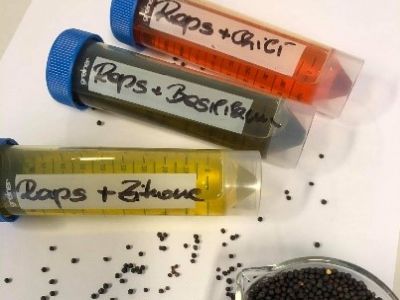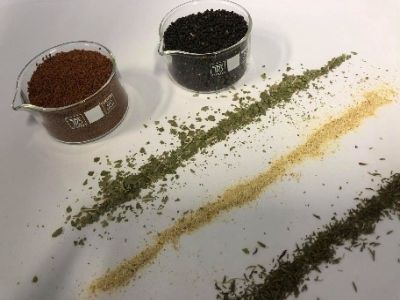INNOVATIVE OILS - LESS WASTE
Development of innovative oils with simultaneous improved utilization of production wastes

Picture: Bettina Schwarzinger

Picture: Bettina Schwarzinger

Picture: Bettina Schwarzinger
There are various oilseeds that can be used for the production of vegetable oils. In Upper Austria, mainly seeds such as sunflower and rapeseed are used. Lately, several other promising oil seed alternatives from regional and organic cultivation have become available, e.g., Lallemantia iberica (dragon´s head) or different mustard seeds. These oils will initially be produced in small quantities and then tested for their suitability as food. For example, the stability/storability of the respective oils and their fatty acid composition play an important role, as the fatty acid composition of an oil determines its storability.
Addition of herbs or spices during oil production opens up new horizons for oil manufacturers. On the one hand, such oils exhibit a favourable taste and smell, on the other hand, the respective oils can be more stable and have health-promoting properties. Therefore, the influence of these additives on the quality and stability of an oil will be investigated in this project. An essential point is also to rule out potential chemical or biological contaminations and impurities.
During the production of untreated virgin high-quality oils, large amounts of press cake are produced. Despite their favourable nutrients and bioactive compounds, they are mainly utilized as animal feed. The global demand for animal protein is expected to double by 2050. Environmental and health concerns concerning meat production are making oilseed press cakes a promising alternative protein source. These are produced in large quantities worldwide and are naturally rich in high-quality protein. This means that the use of more expensive oilseeds can also be economically justified. For a further utilization of this by-product it is necessary to know major compounds (e.g. protein content) in more detail, but also properties regarding stability and product safety. These can vary depending on the oilseed type or the addition of herbs or spices. These aspects shall be investigated to identify and characterize possible ideal candidates for further utilization.
Lead Researcher:

FH-Prof. Priv.-Doz. Dr. Julian Weghuber
FFoQSI Area Leader GREEN
Head of Department
Food Technology and Nutrition, University of Applied Sciences Upper Austria
julian.weghuber@fh-wels.at
+43 5 0804 44403
www.fh-ooe.at




